Yorkshire Terrier Nose Issues
Overview
There are a number of issues that are related to a Yorkie's nose that you should be aware of. Issues can pop up quickly. Though some concerns are more common depending on the time of year, each season brings about a new element that can affect the nose of a dog of any age. Whether your Yorkie is currently having a problem or you want to be prepared to react quickly if something develops, this page will be your guide for all nose related elements.
We will go over:
- What is ideal - Wet VS Dry, Warm VS Cold noses
- When a Yorkie's nose is overly dry
- Cracked noses, peeling
- Crusting and sores
- Runny noses
- Bleeding from the nose
- Color changes
- Proper protection of the nose
Wet or Dry, Cold or Warm: Your Yorkie's Nose
Many people take note of both the tactile temperature of a Yorkie's nose and its level of perceived moisture to determine if the dog is healthy. No doubt, many owners have heard that the nose should be wet and cold. However, there is a lot more to it than this.
Wet or Dry - In many cases, both a wet and a dry nose are considered normal, to a certain degree. In just a day, a Yorkshire Terrier's nose can change from one to the other. However a big swing on either end of the spectrum may point to a problem. For example, an overly wet nose may be a sign of a soon-to-come runny nose…
And a consistently overly dry nose can lead to cracking and peeling. If your Yorkie's nose fluctuates from moderately moist to slightly dry, without any other issues, this would be considered normal.
Some elements that can cause temporary dryness or are a precursor to more severe drying issues include:
- Too much sun exposure (even if indoors and the dog is under a window, etc.)
- Chapping from winter weather or excessively licking the nose
- Being situated close to a heat source (heating vent, radiator, etc.) this is due to both the heat and the dry air.
- When just waking up -One of the leading causes of a nose feeling wet is that the puppy or dog licks it throughout the day; since this doesn't happen when a Yorkie sleeps, it may be dry when he first wakes up.
If your Yorkie's nose is regularly dry without any other red flag issues (peeling, cracking), it's recommended to:
- Move the dog's resting area away from heat sources, if applicable
- Use a humidifier if the air in the house is very dry; this is most common in the wintertime
- Protect the nose with balm or butter (more ahead) to guard against outdoor elements; this is for both hot sunny days and cold winter days.
Ahead we will discuss chronic, severe dry nose problems with other signs such as peeling and/or cracking.
Cold or Warm - With this element, there can also be a range of what is considered to be normal. If a Yorkie has a dry nose, it may automatically feel warmer to the touch than if it were moist. In general, it is common for a Yorkshire Terrier's nose to fluctuate between feeling cold and warm.
There are some things that can temporarily make a dog's nose quite warm:
- Sun exposure - The nose leather naturally does not have any protection from the sun and if a Yorkie is outside for 30 minutes or more on a hot, sunny day the leather can absorb the heat, making it feel warm.
- Slight dehydration - A loss of between 1 to 5% of body fluids constitutes slight dehydration and can cause the nose to feel warm and dry, along with possible trouble in focusing, irritability and/or headache (the dog may rub his forehead against surfaces)
If your Yorkie's nose is regularly warm without any other troubling signs (fever, lethargy, cracking, and/or feeling hot, etc.), it is a good idea to:
- Protect the nose from too much sun exposure (more ahead)
- Make sure that your Yorkshire Terrier is drinking enough water. Dogs that are not hydrating enough can often be encouraged to drink more when a canine water fountain is employed.
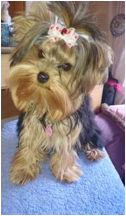
Dry, Cracked and/or Peeling Noses
The nose is comprised of skin; however it is very sensitive as it has only 3 layers of skin as opposed to the 5 layers that cover the body. This is one reason why a dry nose can quickly escalate into a peeling or cracking issue. The outer layer, called the stratum corneum; has grooves that give it texture. Being very thin, any problem that causes this layer to peel away or develop cracks will expose the pink layer underneath.
These sorts of issues can be very painful for dogs, so it is important to treat this as soon as possible and to take steps to prevent issues from developing in the future.
The most common causes of cracked and peeling noses are the same ones as chronic dryness, that have not been resolved, thus leading to a more severe problem:
- Sun exposure - Without protection, a sensitive nose can not only become dried out, over time there can be sun damage and in some cases, an actually sun burn to the nasal skin. Ahead we will discuss treatment.
- Dry air - This is particularly common during the colder months when the house is heated. The air may be very dry, which can cause dry skin problems over the entire body, but may be much more noticeable on the nose. While using humidifiers will help, you will want to address the cracking and peeling to bring the nose back to its healthy state.
- Dehydration - A Yorkshire Terrier may be slightly to moderately dehydrated without any other signs other than dryness; though issues such as irritation, decreased ability to focus and lethargy may not be immediately picked up by some owners. Yorkies should drink a minimum of 1 ounce of water for each pound of body weight; however this can double depending on the dog's activity level, health status and temperature that the dog is exposed to (both indoors and outdoors).
Using a canine water fountain can work well to encourage a Yorkie to drink more. Additionally, adding water-rich foods to his meals or offering them as snacks can count toward the dog's daily water intake… Watermelon, raspberries and/or blueberries are good choices as they are safe for canines to eat in moderation and high in water (92, 87 and 85% respectively).
- Chapping - The skin on a Yorkie's nose can become chapped and this is very common in the winter when weather can be harsh, with cold air and whipping winds.
At Home Treatment of Cracking and Peeling - Treatment for chapping, peeling and minor crusting issues will involve using a quality healing nose balm or butter. This will soothe the sensitive skin and add a layer of relief to nourish, heal and moisturize.
Here are some tips:
- We recommend a product that does not contain chemical and organic, if possible, since a puppy or dog will tend to keep licking at the nose.
- Look for one that is scent-free, as a scented product may cause a Yorkie to resist having it applied.
- Apply this liberally each evening right before your Yorkshire Terrier goes to sleep for the night.
- Also apply this to the nose every 4 to 5 hours. Near meal times, apply this after the Yorkie eats.
- Once the nose has healed, dab a small amount on 2 to 3 times per day so that the nose is shielded from future damage.
With the right product, expect to see improvement within 5 to 7 days and complete healing within 2 to 3 weeks. Do be sure to also address any issues of water intake and dry air in the house.
Many cases of cracking and peeling can be treated at home; however you will want to check with the vet, especially if there is:
- Bleeding - If cracks deep enough that they are bleeding; this often means that the issue involves all 3 layers of skin. Infection can set in.
- A sign of infection - A severely cracked nose leaves the skin open and vulnerable to bacteria and infection. If there is any puss oozing from the cracks, if the nose appears to have areas that are swollen, if your Yorkie is showing signs of pain, if there is a fever, etc. these are red flags that the vet should perform an examination as antibiotics and other prescribed medications may be needed.
- The nose is not healing - If there seems to be no improvement after 7 days with the home remedy.
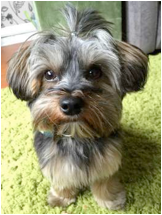
Nose Crusting and Sores
Most common: Small crusty flakes can be sign of healing; if there were small cracks or pieces of skin that flaked off, those areas can scab over. Crusty scabs on the nose are often red or brown and can simply be the body's method of protecting the sensitive skin from germs while the skin cells rejuvenate.
There are some medical conditions which can cause rather severe sores that crust over on the nose. This includes:
Discoid Lupus Erythematosus - This is a type of skin disease that also affects the lips, ears and eye lids. In some cases, there will be open sores on the genitals. With this disease, there can be discoloration to the dog's nose as well.
Treatment involves both corticosteroids and immunosuppressive medications. Since sunlight exposure can worsen the condition, owners are often instructed to apply sunscreen to the dog's nose for any outdoor activities.
Pemphigus Foliaceous - This is an autoimmune skin condition. Symptoms include crusty skin lesions along with boils that most often develop along the bridge of a dog's nose. These often grow into somewhat rather large pustules that easily rupture and then turn into dried crusty scabs. With some dogs, this can travel up to include the entire muzzle and even up to the ears. In rare cases, it will develop on the paw pads. Minor cases are treated with topical hydrocortisone. Moderate to severe cases are treated with Prednisone. It should be noted that as a dog is tapered from this, the disease may flare up again.
At home treatment for crusty nose issues
If a Yorkie has a minor case of crusting that can be attributed to an earlier bout of dryness or slight cracking due to weather, a lack of humidity, chapping or slight dehydration, this can be often treated at home using a quality balm or butter as with dry, cracked noses.
If you do not see improvement within 7 days or if there are any other symptoms, including but not limited to change in appetite, fever, vomiting, diarrhea, weakness and lethargy, the puppy or dog should be examined by the veterinarian.
Yorkshire Terrier Runny Noses
Many dogs naturally have a small degree of a very thin, clear nasal discharge, however this is often not noticed due to the dog licking the nose before owners take notice.
If discharge is runny enough that fluid leaks out soon after wiping the nose with a dry cloth, if the discharge has any color to it (yellow, gray, green, brown, etc.) or if the discharge is thick, this points to a health issue that will need veterinary treatment.
Possible reasons include:
Allergies - This is by far the most common reason why a Yorkshire Terrier will have a runny nose. And this can take some owners by surprise since allergies can develop in a Yorkie of any age, at any time. This includes seasonal allergies (pollen, weeds, grasses), food allergies (the most common cause is not whole foods, but the chemical preservatives, coloring and flavoring that can be found in commercial brands) and contact allergies (carpeting, laundry detergent, material such as wool, etc.)
Of these three, seasonal allergies are the most likely culprit of a runny nose without any other signs such as itchy skin (though this can occur as well).
Treatment can range from OTC Benadryl for acute episodes to prescribed antihistamines for moderate to severe cases.
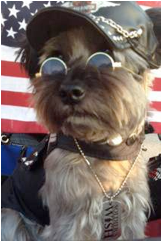
Keeping the house as free from allergens as possible is an important part of treatment. HEPA certified filters should be used in both AC's and in vacuum cleaners. Bedding and other washables should be washed and dried using hypoallergenic detergent. More frequent baths may be needed to wash pollen and other airborne chemicals off of the Yorkie's coat.
A blockage - If you have a curious Yorkshire Terrier, you'll understand how common this is. A wide range of tiny items can be sucked up into the nose when the dog is sniffing around. This includes blades of grass, seeds… even such random things such as pencil erasers and a small artificial nail has been recovered from the nose of toy breeds that inadvertently snorted these objects.
In some cases, you may be able to spot the culprit and if it is visible, you may be able to remove it with a tweezers. If you are unsure, wait for the vet to do it. In some cases, it will be lodged further up the nasal canal, where it causes quite a bit of discomfort. Signs are odd breathing, snorting, pawing at the nose and/or slight bleeding, along with discharge that may be leaking out of just one nostril.
The veterinarian will be able to remove the obstruction; though this sometimes needs to be done with the dog under sedation.
Tooth infection - The roots of the upper teeth located very close to nasal passages and for this reason, a dental infection can cause a runny nose. Even if you routinely clean your Yorkie's teeth, offer healthy dental treats and have his teeth examined by the vet, infection can still occur. Many Yorkies will eat less, due to discomfort and/or may seem anxious or distressed (tooth pain can be quite severe). This is treated on a case by case basis, with possible extraction and with antibiotics to clear up the infection
.
Less common causes - There are a wide range disease and conditions that can trigger a runny nose. Rare, yet possible include but are not limited to cryptococcosis (a fungal disease), nasal growth (polyps , tumors), distemper and pneumonia.
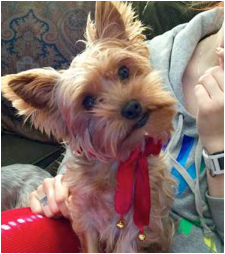
Bloody Noses
Seeing your Yorkshire Terrier have a bloody nose (Epistaxis), is understandably worrisome.
Let's look at some possible causes:
Trauma - Even if you did not see it occur, it only takes a split second for a dog to bonk his nose against something hard enough to cause an acute bloody nose.
Let's go over what to do if your Yorkie gets a nosebleed:
1) Try to remain calm, since your dog will pick up cues from you (both your tone of voice and your actions), which can cause him/her to become stressed as well and this can increase the rate of blood loss.
2) Gently apply a soft ice pack (wrapped in a washcloth) to the bridge of the nose, while you are seated and have your Yorkie cradled in your arms. Apply a light, steady pressure more so to the nostril that is bleeding.
3) If the bleeding does not stop after 15 minutes, it will be time to take the dog to the vet.
Remember that if you do not know what caused the trauma to the nose, it may also involve other parts of the body… for example, if a Yorkie fell from the sofa and landed wrong, there may be injury to the hips, back, neck, etc. Always look for any signs of distress (limping, whining, resting in an odd position, etc.) and bring your dog to the vet clinic if you suspect that there are any injuries.
Other less common reasons - This list of what can cause an acute bloody nose or a chronic nose bleeding issue are very wide ranging. This includes seemingly random events such as snake bite (we do know of one toy dog that was sitting by a river with her owner, was bitten by a snake and sadly passed away from the toxin)… to cancer, nasal polyps, or even Rocky Mountain spotted fever. It is never normal for a dog to have nosebleeds and unless it was caused by a minor trauma that quickly responded to at-home treatment, always bring your Yorkshire Terrier to the vet to have this symptom diagnosed.
The Color of a Yorkshire Terrier's Nose
Per the AKC, FCI, KC, CKC and other major kennel clubs, the Yorkshire Terrier breed 'should' have a black nose. This is the breed standard. However, there are some Yorkies that have brown noses or black noses with one or more medium to dark brown spots. While considered a fault in the show ring, these natural variations in skin pigmentation will not be related to any sort of health issue. It should be noted, however, that this is a genetic trait and dogs that have color faults should not be bred, since the goal of ethical breeding is 'betterment of the breed' which includes striving to meet the strict breed standard guidelines. This said, brown nosed Yorkies are exceedingly adorable and often have a unique, special look that owners appreciate.
Nose Color Changes
Genetics - As we touched on above, while most Yorkshire Terriers will have a black nose (often described as jet black), some have brown or black/brown noses. For these dogs that are genetically predetermined to have brown in the nose, it is not uncommon for there to be moderate to dramatic color changes as the Yorkie matures. The nose may begin as black and then change to brown… or small brown spots may widen and enlarge to cover larger areas of the nose. This type of color change takes place while the Yorkie is maturing into an adult.
In most cases, if brown is to appear, this can gradually develop up until the age of 3 years old.
Staining - Colored plastic food and water bowls are one of the major culprits of this. The dyes that can leak from these will do 2 things: 1) the chemicals have a dry effect that gradually removes the top layer of skin from the nose and then 2) the dyes will gradually stain the second, exposed layer of skin. And these two elements are what can cause the nose to become discolored.
Another issue seen with plastic bowls is a reaction to a chemical known as p-benzylhydroquinone. This chemical leaks out into food and water and is absorbed into the skin, leading to changes in skin pigmentation and swelling, most notably on the nose and lips.
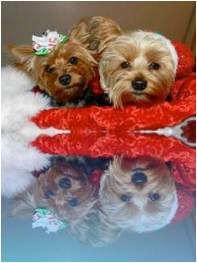
Stainless steel bowls are recommended; these stay in place better, are easier to clean, there is less chance of bacterial growth and of course, they do not have dyes.
Seasonal Fading - There are some breeds that are very sensitive to sun exposure (like the Maltese) and while the Yorkshire Terrier is not traditionally one of them, some are more light sensitive than others. This is sometimes referred to as 'snow nose' or 'winter nose'. This change has to do with vitamin D and how skin pigmentation is triggered by sunlight. For those Yorkies that do have this sensitivity, the nose will lighten during the winter and become darker during the summer. In extreme cases, the nose may develop a pink spot (often right in the center).
Pink spots - The most typical reason for a pink spot to appear on a Yorkshire Terrier's nose is a peeling of the top layer (or two) of skin, that then exposed the inner layer. In these cases, it will be important to protect this delicate area with a quality nose butter or balm to allow it to heal. For some dogs that have this sort of deep peeling, there may permanently be a lighter color where the damage occurred.
Nasal depigmentation (Dudley nose/ vitiligo) - While uncommon with this breed, this is a condition in which the nose fades, sometimes quite dramatically. It can go from black to brown to pink and even white. No treatment is given, as this is seen as a cosmetic issue only.
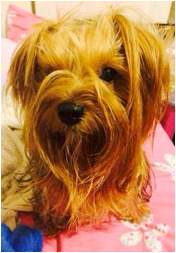
Protecting Your Yorkie's Nose
There are a few things that you can do to keep your Yorkshire Terrier's nose in good health:
1) Nose balm. This is a must-have grooming item. In the summer, it protects a dog's nose from the sun, which can cause everything from dryness to burns. In the winter, it prevents chapping, drying and cracking. If a Yorkie has an issue with peeling, cracking, chapping or dryness, it can heal these issues. Look for organic, scent free balms of high quality (they will be thick enough to stay on despite some licking) and will have natural ingredients to moisturize, nourish and restore skin.
2) Add humidity. Arid air, most typically a problem during the cold winter months, can wreak havoc on a Yorkie. It can affect the skin on the entire body (causing dryness and itching), the eyes (dry eye) and the nose (drying that leads to peeling and cracking). Running a humidifier near the area that your dog sleeps and rests can help quite a bit. Other home remedies include adding houseplants to your rooms, setting up open water containers out on radiators and leaving the bathroom door open when showering.
3) Hydration. Don't assume that your dog will automatically drink his/her require amount of water for the day. Dogs can become distracted and/or may not drink stale water. Wash the bowl each day, offer water that has been filtered and bring along some H20 when you take your Yorkie outside for walks and exercise.
4) Supervise outdoor sniffing. Oh, the trouble our dogs can get into when they are allowed to use their nose to explore when outside… From red ant bites, to bee stings to snorting up a pebble… a wide range of problems can occur if a dog sticks his nose under bushes, in tall grasses or other areas. While dogs do need to sniff around (after all, it satisfies a natural canine instinct), do be careful about where your Yorkie does this.